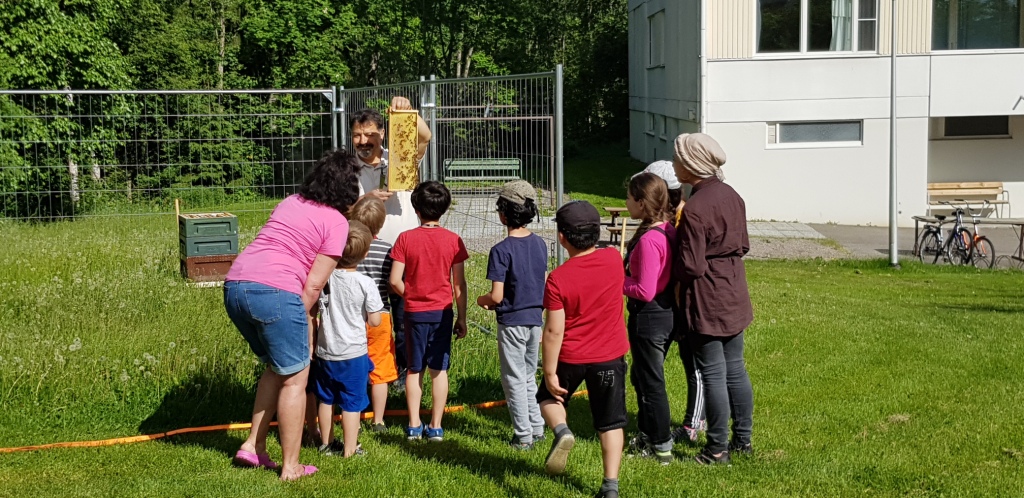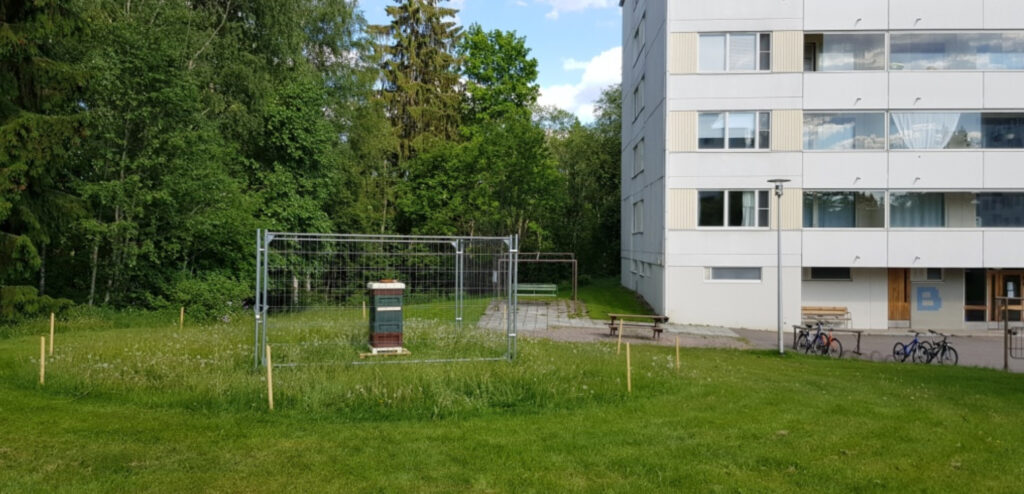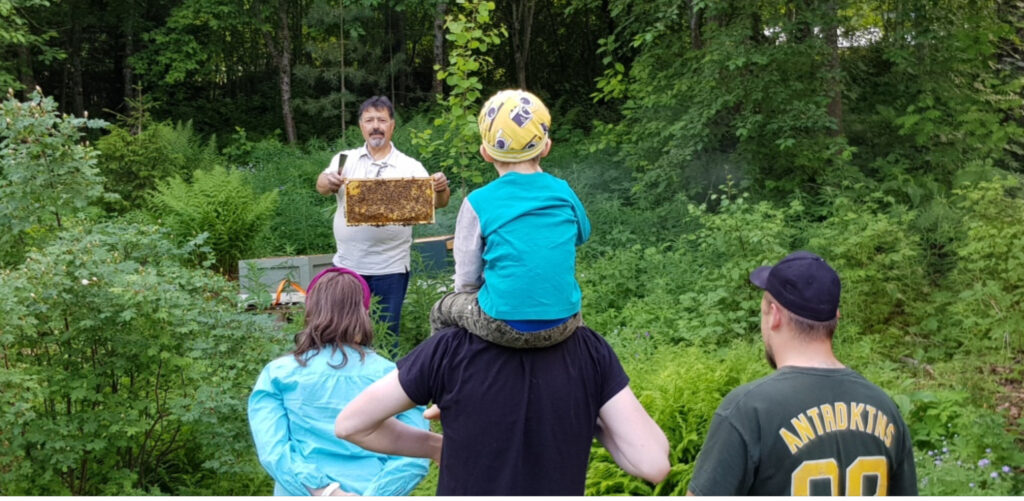
The number of bees has fallen alarmingly in recent years. Municipal housing company Lahden Talot is renting beehives on Timonkatu, thus saving bees, supporting local biodiversity and involving citizens in circular economy practices in a new urban experiment.
Author: Anna Svartström
Contributing to sharing economy with the help of small-scale companies like Suomen Lähiluomu makes it possible for citizens to help bees and contribute to the wellbeing of local and global ecosystems by adding beehives, insect hotels, leaving the lawn unmoved and by planting bee-friendly flowers to the backyards or balcony. Circular economy and wellbeing are themes of the Lahti Green Capital 2021, promoting and showcasing great private and public sustainable initiatives happening in Lahti (Green Lahti 2021).
On May 11.2020, Lahden Talot rented the first beehive through Suomen Lähiluomu company on Timonkatu at the initiative and request of the residents’ association. Furthermore, Lahden Talot left the lawns unmoved nearby the nest to promote the spread of bee-friendly plants and flowers that attract bees and improve pollination while bringing joy to residents while promoting the general welfare of insects and ecosystems. The beehive is protected by possible vandalism light cage installed around the beehive to prevent vandalism. Kamran Fakhimzadeh from Suomen Lähiluomu, who calls himself the bee doctor, visits and takes care of the nest a couple of times a week. (ESS 2020.)
Born in Iran, Kamran Fakhimzadeh is one of Finland’s leading beekeeping experts. Fakhimzadeh, who defended his P.hd dissertation on bee diseases from the University of Helsinki in 2001. Kamran Fakhimzadeh’s company Suomen Lähiluomu oy rents sharing economy beehives to citizens, companies, or apartment buildings complexes in Päijät-Häme, Finland. In addition to Lahti, there are beehives in Asikkala, Hollola, Orimattila and Iitti. There are nests in the city of Lahti, for example, on the roof of the travel center and the hotel Seurahuone. The goal of the beehive rental business is to increase people’s awareness of bees and promote the environment and sustainable living. Citizens should know what the difference is between a wasp and a bee. If the bees disappear, we will starve to death. Even for a small jar of honey, the bees visit millions of flowers to get nectar. Bees can be helped by citizens contributing to circular economy practices by renting beehives or by planting bee-friendly flowers in their yard.

Image 1. Beehive and flower field infront of an apartment building on Timonkatu. (Image: Kamran Fakhimzadeh)
Saving bees and involving citizens in environmentally responsible activities. Lahden Talot planned events where residents got to learn more from bees and beekeeping. Fakhimzadeh taught residents about the importance of pollination. Every other week the bees were available at Timonkatu and the cage was open for the public, children and residents waited in line approximately 5 meters from the bees, eager to see the bees up-close and learn from the ”bee doctor” valuable information about the ecosystems that bees are in charge of. Children were regular visitors showing lots of interest in the beehive. Nobody got stung during the experiment (May-September 2020).
The communal beehive sharing experiment went so well that in May 2021, Lahden Talot increased beehives with one more colony in Timonkatu 5 and 4 more beehives in 3 other locations around Lahti in their Lahden Talot municipal housing complex. They will make a similar metal cage for no vandalism to occur to the bees. The practice promotes a modern way of municipal housing taking responsibility for local landscaping and contributing to healthier biodiversity in the city.

Image 2. The Bee doctor is involving a small gathering of citizens in beekeeping. (Image: Kamran Fakhimzadeh)
The Interreg Europe funded project CECI, (Citizen Involvement in Circular Economy Implementation), shares information, experiences, and good practices of citizen participation in a circular economy (Interreg Europe 2020a). The project is led by LAB University of Applied Sciences. Saving bees in Lahti as a beehive rental service practice is one of the CECI good practices (Interreg Europe 2020b). Circular economy practices from all over Europe including good practices from the CECI project are visible and accessible on the Interreg Europe supported Policy Learning Platform (Interreg Europe 2020c).
The 20th of May is the annual international world bee day, which aim to raise awareness of the importance of bees. According to the UN (2021) “Nearly 90% of the world’s wild flowering plant species depend, entirely, or at least in part, on animal pollination, along with more than 75% of the world’s food crops and 35% of global agricultural land. Not only do pollinators contribute directly to food security, but they are key to conserving biodiversity…”. CECI project is taking part and urging citizens to act planting diverse sets of bee-friendly flowers at different times of the year. Sponsoring or renting a hive as this article urges citizens to involve in such sharing economy practices. Beekeepers should promote communal beehives or give citizens the possibility to rent or sponsor a hive for the benefit of the planet. While Governments, Municipalities and decision-makers can strengthen citizen participation with monetary incentives as participatory budgeting proposals. As well as funding and increasing collaboration between national and international organizations, organizations and academic research to promote the increase and wellbeing of bees (UN 2021).
References
ESS. 2020. Lahden Talot asuttaa nyt myös mehiläisiä – ”Asukkaille mukavaa seurattavaa”. [Cited 3 May 2021]. Available at: https://www.ess.fi/paikalliset/1808574
Green Lahti. 2021. Tulevaisuudentekijät. [Cited 3 May 2021]. Available at: https://greenlahti.fi/tekijat?fbclid=IwAR25rSuNDMK_fKweIgKY15H644XgFG89bB2ALDPLSqX15KChL4wIZbhrRcM
Interreg Europe. 2020a. Project Summary. CECI. [Cited 3 May 2021]. Available at: https://www.interregeurope.eu/ceci/
Interreg Europe. 2020b. Good Practices Definition & Criteria. [Cited 3 May 2021]. Available at: https://www.interregeurope.eu/ceci/news/news-article/7469/ceci-good-practices-definition-criteria/
Interreg Europe. 2020c. What is the Policy Learning Platform? Policy Learning Platform. [Cited 3 May 2021]. Available at: https://www.interregeurope.eu/policylearning/what-is-policy-learning-platform/
Suomen Lähiluomu oy. Facebook. [Cited 3 May 2021]. Available at: https://www.facebook.com/Suomen-L%C3%A4hi-Luomu-Oy-364541580999870/
UN. 2021. We all depend on the survival of bees. [Cited 3 May 2021]. Available at: https://www.un.org/en/observances/bee-day
Author
Anna Svartström works at LAB University of Applied Sciences and is involved in the CECI project.
Illustration: Kamran Fakhimzadeh
Published 5.5.2021
Reference to this article
Svartström, A. 2021. Increasing wellbeing and knowledge of bees in Lahti. LAB Pro. [Cited and date of citation]. Available at: https://www.labopen.fi/lab-pro/increasing-wellbeing-and-knowledge-of-bees-in-lahti/






